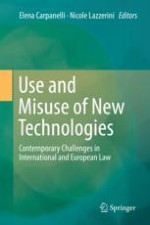2019 | OriginalPaper | Buchkapitel
New Technologies in International (and European) Law—Contemporary Challenges and Returning Issues
verfasst von : Maurizio Arcari
Erschienen in: Use and Misuse of New Technologies
Aktivieren Sie unsere intelligente Suche, um passende Fachinhalte oder Patente zu finden.
Wählen Sie Textabschnitte aus um mit Künstlicher Intelligenz passenden Patente zu finden. powered by
Markieren Sie Textabschnitte, um KI-gestützt weitere passende Inhalte zu finden. powered by
